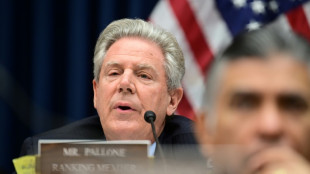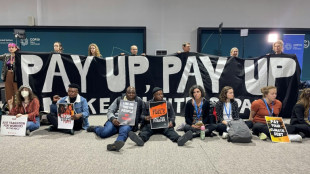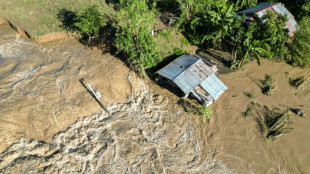
-
 US lawmaker accuses Azerbaijan in near 'assault' at COP29
US lawmaker accuses Azerbaijan in near 'assault' at COP29
-
Tuchel's England have 'tools' to win World Cup, says Carsley

-
 Federer hails 'historic' Nadal ahead of imminent retirement
Federer hails 'historic' Nadal ahead of imminent retirement
-
Ukraine vows no surrender, Kremlin issues nuke threat on 1,000th day of war

-
 Novo Nordisk's obesity drug Wegovy goes on sale in China
Novo Nordisk's obesity drug Wegovy goes on sale in China
-
Spain royals to visit flood epicentre after chaotic trip: media

-
 French farmers step up protests against EU-Mercosur deal
French farmers step up protests against EU-Mercosur deal
-
Rose says Europe Ryder Cup stars play 'for the badge' not money

-
 Negotiators seek to break COP29 impasse after G20 'marching orders'
Negotiators seek to break COP29 impasse after G20 'marching orders'
-
Burst dike leaves Filipino farmers under water

-
 Markets rally after US bounce as Nvidia comes into focus
Markets rally after US bounce as Nvidia comes into focus
-
Crisis-hit Thyssenkrupp books another hefty annual loss

-
 US envoy in Lebanon for talks on halting Israel-Hezbollah war
US envoy in Lebanon for talks on halting Israel-Hezbollah war
-
India to send 5,000 extra troops to quell Manipur unrest

-
 Sex, drugs and gritty reality on Prague's underworld tours
Sex, drugs and gritty reality on Prague's underworld tours
-
Farmers descend on London to overturn inheritance tax change

-
 Clippers upset Warriors, Lillard saves Bucks
Clippers upset Warriors, Lillard saves Bucks
-
Acquitted 'Hong Kong 47' defendant sees freedom as responsibility

-
 Floods strike thousands of houses in northern Philippines
Floods strike thousands of houses in northern Philippines
-
Illegal farm fires fuel Indian capital's smog misery

-
 SpaceX set for Starship's next flight, Trump expected to attend
SpaceX set for Starship's next flight, Trump expected to attend
-
Texans cruise as Cowboys crisis deepens

-
 Do the Donald! Trump dance takes US sport by storm
Do the Donald! Trump dance takes US sport by storm
-
Home hero Cameron Smith desperate for first win of 2024 at Australian PGA

-
 Team Trump assails Biden decision on missiles for Ukraine
Team Trump assails Biden decision on missiles for Ukraine
-
Hong Kong court jails 45 democracy campaigners on subversion charges

-
 Several children injured in car crash at central China school
Several children injured in car crash at central China school
-
Urban mosquito sparks malaria surge in East Africa

-
 Djibouti experiments with GM mosquito against malaria
Djibouti experiments with GM mosquito against malaria
-
Pulisic at the double as USA cruise past Jamaica

-
 Many children injured after car crashes at central China school: state media
Many children injured after car crashes at central China school: state media
-
Asian markets rally after US bounce as Nvidia comes into focus

-
 Tens of thousands march in New Zealand Maori rights protest
Tens of thousands march in New Zealand Maori rights protest
-
Five takeaways from the G20 summit in Rio

-
 China, Russia ministers discuss Korea tensions at G20: state media
China, Russia ministers discuss Korea tensions at G20: state media
-
Kohli form, opening woes dog India ahead of Australia Test series

-
 Parts of Great Barrier Reef suffer highest coral mortality on record
Parts of Great Barrier Reef suffer highest coral mortality on record
-
Defiant Lebanese harvest olives in the shadow of war

-
 Russian delegations visit Pyongyang as Ukraine war deepens ties
Russian delegations visit Pyongyang as Ukraine war deepens ties
-
S.Africa offers a lesson on how not to shut down a coal plant

-
 Italy beat Swiatek's Poland to reach BJK Cup final
Italy beat Swiatek's Poland to reach BJK Cup final
-
Japan, UK to hold regular economic security talks

-
 Divided G20 fails to agree on climate, Ukraine
Divided G20 fails to agree on climate, Ukraine
-
Can the Trump-Musk 'bromance' last?

-
 US to call for Google to sell Chrome browser: report
US to call for Google to sell Chrome browser: report
-
Macron hails 'good' US decision on Ukraine missiles

-
 Italy eliminate Swiatek's Poland to reach BJK Cup final
Italy eliminate Swiatek's Poland to reach BJK Cup final
-
Trump expected to attend next Starship rocket launch: reports

-
 Israeli strike on Beirut kills 5 as deadly rocket fire hits Israel
Israeli strike on Beirut kills 5 as deadly rocket fire hits Israel
-
Gvardiol steals in to ensure Croatia reach Nations League quarter-finals


Volunteers risk lives to deliver supplies to besieged Mariupol
As thousands tried to flee Ukraine’s besieged city of Mariupol, a small group of former residents on Tuesday packed cabbages, cooking oil, pasta, and other supplies into minivans to make the perilous journey back.
Risking their lives, the volunteers headed back to a city tormented by hunger, horror, and death to deliver much-needed supplies and evacuate people to Zaporizhzhya – a hub for people fleeing Ukraine’s heavily bombarded east to the country’s west.
"We buried our neighbours, we saw death everywhere and even my children saw it," said Mariia Tsymmerman, who escaped Mariupol with her family two weeks ago and now heads the column of eight to 10 vehicles marked with the word "volunteer" in red paint.
"I know a woman who killed her own dog to feed her children," she said.
Unarmed and with no protective clothing, the volunteers face bombs, mines, and shelling, as well as Russian checkpoints where troops are known to sometimes open fire. The trip through Russian-occupied territory and back usually takes three days.
Some of the volunteers are looking for missing family members after Mariupol lost almost all communications in early March, while others feel it their duty to help.
Yet they are taking a huge risk: two days ago volunteers heard that one of their minivans had been hit by gunfire.
They don’t yet know what happened or if the people inside are safe.
One of the group’s drivers, Yuri, is deaf in one ear after Russian troops made him strip naked, put a gun to his shoulder, and shot it into the air. He still plans to return to help people.
Tsymmerman, 38, escaped Mariupol with her husband and three children on March 16 and, since then, she has travelled back five times to help, with her husband driving one of the vans.
As Russian bombs fell on the Mariupol, her family spent weeks moving from bomb shelter to bomb shelter before they fled.
Her son was so terrified by one airstrike, that he has been wetting himself ever since.
"There are attacks from the air and people are fighting in the streets," Tsymmerman told AFP. "That is the scariest thing because they have found a target, and they don’t care if it’s a woman or a child, they still shoot."
On one trip back, she saw the badly burned body of a child lying in the street being eaten by a dog.
The desperation of those who remain to get out is so great that people jump on car bonnets and wheels when the convoy arrives.
Tsymmerman said they try to prioritise children and their parents, and that besides fleeing bombs, people are also scared Russian forces will make them to Russia.
Mariupol’s city council said Tuesday that some 20,000 residents have been forcibly evacuated to Russia and put in so-called filtration camps for further evacuation to remote Russian cities.
Tsymmerman’s father is still in Mariupol, unreachable currently by evacuation efforts because the fighting is too heavy there, while her brother and his family were taken to separatist territory.
"They cry, ask for help and ask to be freed," she said, adding that she is working on how to get there to evacuate them.
Anna Yehurtova, 25, a doctor from Mariupol who now lives in Kyiv, tried to travel back to her home city to help people but when she realised it was too dangerous she opted instead to volunteer in Zaporizhzhya. She helps to coordinate the cars going to Mariupol.
"These people risk their lives and are scared to death of Russian checkpoints – they say they will die there or won’t be able to return again," she said.
"Some drivers have been given subpoenas to join the Russian army as they pass through."
Yehurtova said her brother was also forced to go to separatist-held territory, where he was given a subpoena to fight for the Russian military.
"He told them ‘I’m Ukrainian, I am not going to fight against Ukraine,’" she said.
Yehurtova’s parents live in a village near Mariupol, close to what was the frontline with Russian-backed separatists but is now controlled by Russia.
They told her there is no electricity apart from at the school hall, where the Russians have set up a generator and are showing only Russian state news on television.
"A week after they arrived, they gave them aid and a pension of 7,000 rubles ($80) to convince them it’s nice in Russia."
Nikolai, who did not want to give his full name, was away on a business trip when the war began. Now he was heading back to Mariupol with the convoy and planned to stay there.
"It’s my home. There is nothing else to say," he said.
G.P.Martin--AT
